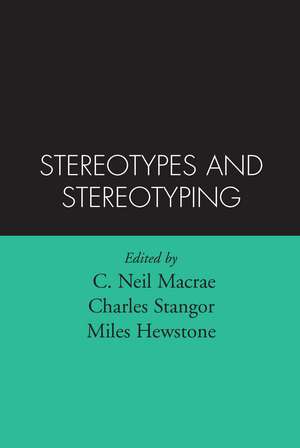Stereotypes and Stereotyping
Editat de C. Neil Macrae, Charles Stangor, Miles Hewstoneen Limba Engleză Hardback – 16 mai 1996
Where do stereotypes come from? How accurate are they, and how do they affect interpersonal and intergroup relations? Can stereotypes be changed? Stereotypes structured sets of beliefs about the characteristics of members of social categories influence how people attend to, encode, represent, and retrieve information about others, and how they judge and respond to them. A comprehensive overview of contemporary research, this volume highlights important approaches that have considerably expanded our understanding of stereotyping in recent years. Integrating cognitive, motivational, emotional, and linguistic perspectives, Stereotypes and Stereotyping demonstrates the diversity and richness of the field today and illuminates new directions for future research.
Preț: 479.03 lei
Preț vechi: 591.40 lei
-19% Nou
Puncte Express: 719
Preț estimativ în valută:
91.70€ • 94.52$ • 77.32£
91.70€ • 94.52$ • 77.32£
Carte tipărită la comandă
Livrare economică 27 februarie-13 martie
Preluare comenzi: 021 569.72.76
Specificații
ISBN-13: 9781572300538
ISBN-10: 1572300531
Pagini: 462
Dimensiuni: 152 x 229 x 30 mm
Greutate: 0.87 kg
Ediția:New.
Editura: Guilford Publications
Colecția Guilford Press
ISBN-10: 1572300531
Pagini: 462
Dimensiuni: 152 x 229 x 30 mm
Greutate: 0.87 kg
Ediția:New.
Editura: Guilford Publications
Colecția Guilford Press
Public țintă
Postgraduate, Professional, Professional Practice & Development, and UndergraduateCuprins
I. Introduction: What Are Stereotypes?
1. Stereotypes as Individual and Collective Representations, Charles Stangor and Mark Schaller
II. Stereotype Formation and Development
2. Social Psychological Foundations of Stereotype Formation, Diane M. Mackie, David L. Hamilton, Joshua Susskind, and Francine Rosselli
3. Physical Appearance as a Basis of Stereotyping, Leslie A. Zebrowitz
4. Assessing Stereotype Accuracy: Implications for Understanding the Stereotyping Process, Carey S. Ryan, Bernadette Park, and Charles M. Judd
III. Stereotype Function and Use
5. Self-Fulfilling Prophecies and the Maintenance of Social Stereotypes: The Role of Dyadic Interactions and Social Forces, Lee Jussim and Christopher Fleming
6. Language and Stereotyping, Anne Maass and Luciano Arcuri
7. The Self-Regulation of Intergroup Perception: Mechanisms and Consequences of Stereotype Suppression, Galen V. Bodenhausen and C. Neil Macrae
8. When Stereotypes Lead to Stereotyping: The Use of Stereotypes in Perception, Marilynn B. Brewer
9. Stereotyping, Prejudice, and Discrimination: Another Look, John F. Dovidio, John C. Brigham, Blair T. Johnson, and Samuel L. Gaertner
IV. Undermining Stereotypes and Stereotyping
10. Contact and Categorization: Social Psychological Interventions to Change Intergroup Relations, Miles Hewstone
11. Motivating Individuals to Change: What Is a Target to Do?, Jennifer L. Eberhardt and Susan T. Fiske
V. Conclusions
12. Modern Stereotype Research: Unfinished Business, David J. Schneider
1. Stereotypes as Individual and Collective Representations, Charles Stangor and Mark Schaller
II. Stereotype Formation and Development
2. Social Psychological Foundations of Stereotype Formation, Diane M. Mackie, David L. Hamilton, Joshua Susskind, and Francine Rosselli
3. Physical Appearance as a Basis of Stereotyping, Leslie A. Zebrowitz
4. Assessing Stereotype Accuracy: Implications for Understanding the Stereotyping Process, Carey S. Ryan, Bernadette Park, and Charles M. Judd
III. Stereotype Function and Use
5. Self-Fulfilling Prophecies and the Maintenance of Social Stereotypes: The Role of Dyadic Interactions and Social Forces, Lee Jussim and Christopher Fleming
6. Language and Stereotyping, Anne Maass and Luciano Arcuri
7. The Self-Regulation of Intergroup Perception: Mechanisms and Consequences of Stereotype Suppression, Galen V. Bodenhausen and C. Neil Macrae
8. When Stereotypes Lead to Stereotyping: The Use of Stereotypes in Perception, Marilynn B. Brewer
9. Stereotyping, Prejudice, and Discrimination: Another Look, John F. Dovidio, John C. Brigham, Blair T. Johnson, and Samuel L. Gaertner
IV. Undermining Stereotypes and Stereotyping
10. Contact and Categorization: Social Psychological Interventions to Change Intergroup Relations, Miles Hewstone
11. Motivating Individuals to Change: What Is a Target to Do?, Jennifer L. Eberhardt and Susan T. Fiske
V. Conclusions
12. Modern Stereotype Research: Unfinished Business, David J. Schneider
Notă biografică
C. Neil Macrae, Ph.D., is a Reader in Psychology at the University of St Andrews, Scotland. His current research interests focus on the role of inhibitory processes in stereotyping, behavioral self-regulation, and mental control. He is an Associate Editor of the European Journal of Social Psychology.
Charles Stangor, Ph.D., is Associate Professor of Psychology at the University of Maryland, College Park. His current research interests focus on the cognitive and motivational determinants of stereotyping and prejudice, the influence of ethnicity on academic performance, and the perception of prejudice by, and effects of prejudice on, stigmatized target persons.
Miles Hewstone, D.Phil., is Professor of Psychology at the University of Wales, Cardiff, and has published widely on attribution theory, social cognition, stereotyping, and intergroup relations. He is a co-founding editor of the European Review of Social Psychology, and a former editor of the British Journal of Social Psychology.
Charles Stangor, Ph.D., is Associate Professor of Psychology at the University of Maryland, College Park. His current research interests focus on the cognitive and motivational determinants of stereotyping and prejudice, the influence of ethnicity on academic performance, and the perception of prejudice by, and effects of prejudice on, stigmatized target persons.
Miles Hewstone, D.Phil., is Professor of Psychology at the University of Wales, Cardiff, and has published widely on attribution theory, social cognition, stereotyping, and intergroup relations. He is a co-founding editor of the European Review of Social Psychology, and a former editor of the British Journal of Social Psychology.
Recenzii
This much-needed volume is a thoroughly modern, thoroughly splendid collection of essays on the psychology of stereotyping written by the area's most influential thinkers and most active researchers. In its pages, readers will find just about everything that social psychology has discovered in a half century of research on this important topic. --Daniel Gilbert, PhD, Department of Psychology, University of Texas at Austin
Sometimes edited books are promissory notes, indications that a lot of people really wish they knew something about a topic. At other times, an edited volume represents a mature body of knowledge in a field that is not only going somewhere but that has in fact just arrived. This book is of the latter variety, and a fine specimen. Stereotypes and Stereotyping collects and advances the best social psychological work in this rapidly developing area. --Daniel Wegner, Ph.D., Professor of Psychology, University of Virginia
This is an excellent and timely collection of chapters by some of the most important researchers and theorists in the area. The past 20 years of work has revealed much about the cognitive aspects of stereotypes and stereotyping. Building on that foundation, social psychologists are now integrating affect, language, interpersonal interaction, and sociocultural variables to provide a more comprehensive account. Are stereotypes affective or cognitive? Are they in individuals' heads or in the cultural environment? Are they accurate or inaccurate? Do they cause or simply rationalize intergroup discrimination? In each case, research shows that the answer is probably both. Multi-level integrative theoretical approaches that can accommodate the interactivity and complexity of stereotypes are not yet fully developed, but the chapters in this book outline what is known and provide clear statements of the major unresolved issues. --Eliot R. Smith, Ph.D., Purdue University
-Sometimes edited books are promissory notes, indications that a lot of people really wish they knew something about a topic. At other times, an edited volume represents a mature body of knowledge in a field that is not only going somewhere but that has in fact just arrived. This book is of the latter variety, and a fine specimen. Stereotypes and Stereotyping collects and advances the best social psychological work in this rapidly developing area. --Daniel Wegner, Ph.D., Professor of Psychology, University of Virginia
This is an excellent and timely collection of chapters by some of the most important researchers and theorists in the area. The past 20 years of work has revealed much about the cognitive aspects of stereotypes and stereotyping. Building on that foundation, social psychologists are now integrating affect, language, interpersonal interaction, and sociocultural variables to provide a more comprehensive account. Are stereotypes affective or cognitive? Are they in individuals' heads or in the cultural environment? Are they accurate or inaccurate? Do they cause or simply rationalize intergroup discrimination? In each case, research shows that the answer is probably both. Multi-level integrative theoretical approaches that can accommodate the interactivity and complexity of stereotypes are not yet fully developed, but the chapters in this book outline what is known and provide clear statements of the major unresolved issues. --Eliot R. Smith, Ph.D., Purdue University
Descriere
A comprehensive overview of contemporary research, this volume highlights important approaches that have considerably expanded our understanding of stereotyping in recent years.












